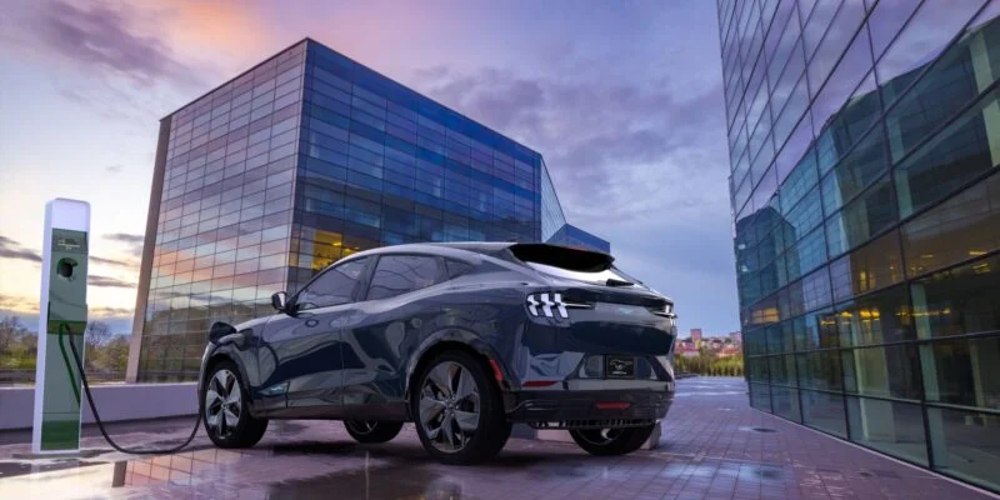(AIER)—In August, Ford announced it was spiking its plan to roll out an all-electric three-row SUV, citing low consumer demand and a crowded market.
“We’re seeing a tremendous amount of competition,” John Lawler, Ford vice chair and CFO, told journalists in a conference call. “In fact, S&P Global … said that there’s about 143 EVs in the pipeline right now for North America — and most of those are two-row and three-row SUVs.”
The news that Ford was scrapping its SUV EV came just a month after the company announced a manufacturing pivot at its plant in Oakville, Ontario. The plant, which had been earmarked for EV production, was shifting production to Ford’s F-series pickups, its flagship gas-powered trucks.
“The move,” the New York Times reported, “is the latest example of how automakers are pulling back on aggressive investment plans in response to the slowing growth of electric vehicle sales.”
The Cost Problem
Ford’s latest pullback from EVs is no surprise to people who’ve been paying attention to the EV market.
More than a year ago I pointed out that news outlets were reporting of EVs “piling up” at dealership lots because of low consumer demand, which ultimately prompted Ford to halve production of its popular F-150 Lightning, reducing output to about 1,600 vehicles per week.
The reality is both lawmakers and Washington and auto companies severely misjudged consumer demand for EVs, which has proven far lower than estimates had projected. There are many reasons for the low demand, but the primary reasons are concerns consumers have with EVs.
Price is one factor. Research in recent years has indicated that despite government subsidies, EVs typically cost on average between $5,000 and $10,000 more than a similar gas-powered vehicle. That EVs are more expensive than gas-powered cars may surprise few readers, but what’s less known is that the price gap is widening.
“EV prices aren’t just going up; they are rising faster than inflation…faster than [internal combustion engine] vehicle prices” Ashley Nunes, a senior research associate at Harvard Law School, testified before Congress in 2023, noting that the inflation-adjusted average price of a new EV had risen to over $66,000 in 2022, compared to $44,000 in 2011.
The Charging Problem
Cost, however, isn’t the only concern of consumers.
An overwhelming percentage of Americans—77 percent, according to a 2023 survey led by the Associated Press-NORC Center for Public Affairs Research and the Energy Policy Institute at the University of Chicago—have concerns about how they would charge an EV if they bought one.
These concerns are not baseless. In February, the New York Times profiled a man Michael Puglia who had recently bought a Ford F-150 Lightning and said it was the “coolest” vehicle he’d ever owned.
“It’s unbelievably fast and responsive,” the Ann Arbor, Mich., anesthesiologist told reporter Neal E. Boudette. “The technology is amazing.”
The problem was the vehicle’s range. When the weather grew colder, Puglia found that the distance his vehicle could travel fell dramatically. His faith in the $79,000 truck dampened, and he found himself wondering if he should sell it.
“People say ‘range anxiety’ — it’s like it’s the driver’s fault,” Puglia told the Times. “But it’s not our fault. It’s actually they’re not telling us what the real range is. The truck says it’s 300 miles. I don’t think I’ve ever gotten that.”
The range problem of electric vehicles is exacerbated by another challenge facing EVs: a lack of charging stations. Nationwide, there was 68,475 private and public charging stations at the beginning of the year, according to the Department of Energy. That’s more than twice the number in 2020, but it’s still just a third of the number of gas stations and far below projections.
The range problem of electric vehicles is exacerbated by another challenge facing EVs: a lack of charging stations. Nationwide, there was 68,475 private and public charging stations at the beginning of the year, according to the Department of Energy. That’s more than twice the number in 2020, but it’s still just a third of the number of gas stations and far below projections.
One reason charging infrastructure has lagged is due to the federal government’s incompetence. Nearly three years ago, the U.S. Departments of Transportation and Energy announced a $5 billion spending effort to build fleets of charging stations to lead “an electric vehicle revolution.” As of the summer of 2024, just seven charging stations had been built.
“That is pathetic,” said US Sen. Jeff Merkley, a Democrat from Oregon. “We’re now three years into this … That is a vast administrative failure.”
Of Profits, and Losses
The decision of automakers to bet big on EV adoption was in some ways rational, in that they were responding to powers in Washington that were pressuring them and incentivizing them to expand electrical vehicle production. But the costs of listening to industry experts and politicians in Washington instead of consumers — and profits — have been severe.
In August 2023, NPR reported that Ford CEO Jim Farley was charging ahead with its ambitious EV expansion even though the company was “losing money on each EV it sells” and consumer demand for EVs was plummeting. Farley’s reasoning was that Ford was attracting new customers, but it was a costly endeavor. Ford reported a loss of $4.7 billion on EV sales in 2023, roughly $40,525 per vehicle sold.
“If the great mass of consumers dislike purple cars with green polka dots, then a society based on private property will not waste resources in the production of such odd cars,” wrote economist Robert Murphy. “Any eccentric producer who flouted the wishes of his customers and churned out vehicles to suit his idiosyncratic tastes, would soon go out of business.”
Murphy wrote these words more than twenty years ago, but in a sense they describe Ford’s business strategy. By producing mass amounts of pricey EVs that consumers didn’t want and selling them at a loss, Ford was in a sense cranking out green polka dotted cars. It was a losing strategy and path to going out of business.
Ford’s massive pullback from EVs is part of a broader return to economic reality. Companies flourish in a free market economy not by serving bureaucrats but consumers, the true “bosses.”
“They, by their buying and by their abstention from buying, decide who should own the capital and run the plants,” Mises wrote. “They determine what should be produced and in what quantity and quality. Their attitudes result either in profit or in loss for the enterpriser.”
Automakers bear responsibility for their decision, and paid the price in the form of losses. But this misallocation of resources likely could have been avoided if not for the federal government’s hamfisted attempts to coerce Americans into EVs, which included not just taxpayer-funded subsidies, but overt pressure from Washington and federal regulations designed to phase-out gas-powered cars.
Fortunately, the centrally planned EV revolution now appears dead in the water, or at least in full retreat. A spokesman for Kamala Harris recently told Axios the presidential candidate “does not support an electric vehicle mandate.”
Forcing Americans into EVs was always a bad idea economically, but it now appears to be a bad idea politically, too.
That’s good news for Ford and American consumers.


